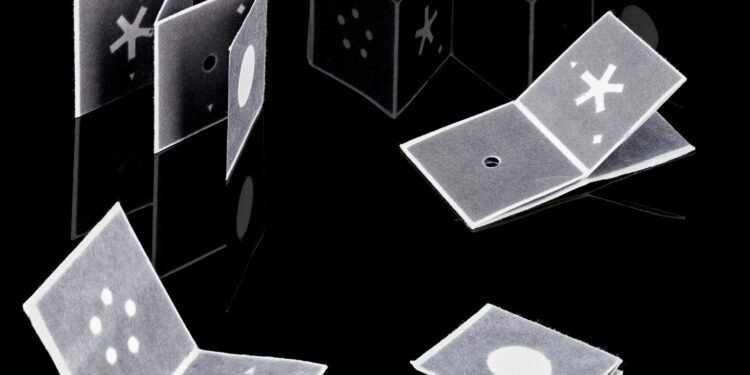Origami paper sensor used for disease detection. Credit: Science Museum Group. Copyright: Science Museum Board of Trustees / supplied
Researchers at Cranfield University have developed an innovative new method of identifying biomarkers in wastewater using origami paper sensors, enabling infectious diseases to be tracked using a mobile phone camera. The new testing device is cheap and quick and could radically change the way public health measures are directed during potential future pandemics.
Their study, “A paper-based microfluidic sentinel sensor enables rapid, on-site monitoring of wastewater in community settings,” is published in the journal Cell Reports Physical Sciencesand involved scientists from the University of Glasgow and Zhejiang University in China.
Wastewater a key way to track infections
Wastewater testing is one of the main ways to assess the prevalence of infectious diseases in populations. Researchers collect samples from various water treatment plants across the country and use the results to understand which areas currently have the highest infection rates. This method has been used during the COVID-19 pandemic to track infection rates in communities and guide public health measures.
Zhugen Yang, professor of biosensing and environmental health at Cranfield University, led the development of the sentinel sensors. He builds on research he conducted in 2020 to develop a test to detect SARS-CoV-2 (commonly known as COVID-19), influenza A and influenza B in wastewater using a paper-based platform and a UV torch or mobile phone camera.
Until now, the most accurate methods for testing wastewater samples have been tests such as polymerase chain reaction (PCR), which must be carried out in centralised laboratories by well-trained staff. This means that samples are collected, stored and transported in a cold chain to the laboratory before being processed, which can take several days and is relatively expensive.
Materials used in Professor Zhugen Yang’s new method for identifying biomarkers are laid out on a laboratory work surface at Cranfield University, UK. Credit: Cranfield University
Origami folded paper test read by mobile phone
The new testing method is quick, easy to use and portable. Wastewater samples are placed on a sheet of wax paper folded like origami. The paper contains chemicals that react with certain disease markers, triggering the appearance of a fluorescent color. Using a cell phone camera, the results can be read and data collected quickly.
Professor Yang developed the new method as part of the National COVID-19 Wastewater Surveillance Programme. In 2021, at the height of the pandemic, he conducted field trials using the test in four quarantine hotels around Heathrow Airport. The entire process, from sample to response, took less than 90 minutes, compared to around four hours for a PCR test, with the tests being conducted in the basement of one of the hotels with minimal equipment.
The results showed that this new device gives results at least as accurate as the PCR test, but at a much lower cost, and can provide early warning of disease in the community. The device is particularly useful in resource-limited areas because of its ease of use, low cost and rapid results.
Professor Yang commented: “During the COVID-19 pandemic, we have proven that rapid analysis of community wastewater is a truly effective way to track infectious diseases and help manage public health. The simple test we have developed costs just £1 and uses the camera function commonly available on a mobile phone, making it easily accessible. This could be a game changer in predicting disease rates and improving public health in the face of future pandemics.”
The device was presented to the Science Museum in London in recognition of its contribution to the national wastewater monitoring programme during the COVID-19 pandemic.
The development of the test is funded by the Leverhulme Trust Research Leadership Scheme and a grant from the Biotechnology and Biological Sciences Research Council. In the future, it could potentially be used to track new variants and help determine whether the variant is continuing to spread in the community, as well as to monitor antimicrobial resistance from a One Health perspective.
More information:
Paper-based microfluidic sentinel sensors enable rapid, on-site monitoring of wastewater in community settings, Cell Reports Physical Sciences (2024). DOI: 10.1016/j.xcrp.2024.102154. www.cell.com/cell-reports-phys … 2666-3864(24)00439-9
Provided by Cranfield University
Quote:Origami paper sensors could help early detection of infectious diseases with new, simple, inexpensive test (2024, September 19) retrieved September 19, 2024 from
This document is subject to copyright. Apart from any fair dealing for the purpose of private study or research, no part may be reproduced without written permission. The content is provided for informational purposes only.



